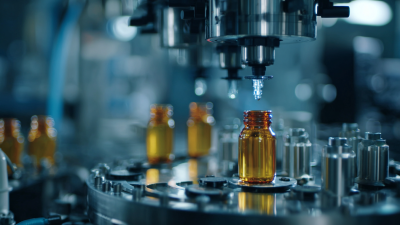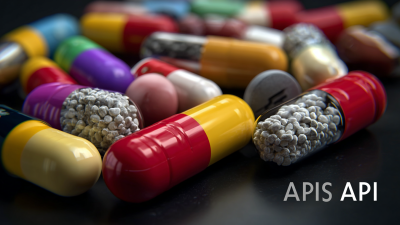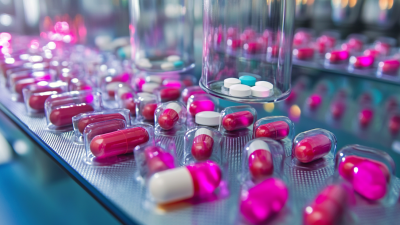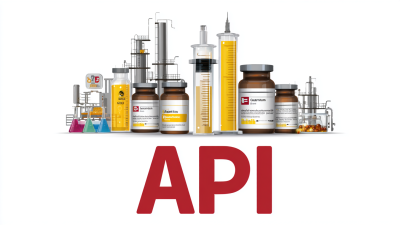In recent years, the pharmaceutical industry has witnessed a profound transformation driven by the emergence of Active Pharmaceutical Ingredients (API) drugs. According to a report by Global Market Insights, the global API market is projected to surpass $200 billion by 2026, reflecting an accelerating demand for innovative therapies and sustainable production methods. API drugs play a crucial role in this dynamic landscape, as they are the key components responsible for the therapeutic effects of medications. Moreover, the shift towards personalized medicine, where treatments are tailored to individual patient profiles, has underscored the significance of high-quality APIs in developing effective pharmaceuticals. As the sector continues to embrace advances in biotechnology and manufacturing efficiencies, the API drug segment stands at the forefront of revolutionizing modern medicine, promising improved patient outcomes and a more agile response to healthcare challenges.

Active Pharmaceutical Ingredients (APIs) are the core elements that make up any medicine, dictating its therapeutic effect. In modern healthcare, the significance of APIs cannot be overstated, as they account for nearly 70% of the total costs in drug development, according to a report by the Research Institute of Pharmaceutical Sciences. This strategic focus on APIs ensures that pharmaceutical companies not only meet regulatory standards but also drive innovation in drug formulations and delivery mechanisms.

The global API market is projected to reach approximately $265 billion by 2024, as stated in a report by Grand View Research. This growth is attributed to the increasing demand for cost-effective and efficient drug manufacturing processes. Advances in biotechnology and a growing emphasis on personalized medicine are transforming the landscape of APIs, enabling the development of targeted therapies that cater to specific patient needs. As a result, the importance of understanding API drugs continues to rise in modern healthcare, shaping the future of effective and tailored medical treatments.
The advent of Active Pharmaceutical Ingredients (API) has significantly transformed drug development, enhancing efficiency and streamlining processes. One of the key benefits of API drugs is their ability to facilitate faster and more cost-effective drug formulations. By focusing on small-molecule APIs, the industry is not only lowering development costs but also improving the overall safety and efficacy of new therapies. This is particularly crucial in a landscape where the demand for differentiated therapies continues to rise.
Tips: To harness the full potential of API drugs, pharmaceutical companies should integrate advanced technologies in their development processes. Embracing automation during formulation development and quality control can drastically reduce production timelines.
Moreover, the use of AI-driven solutions is revolutionizing the pharmaceutical lifecycle—from drug discovery to post-market surveillance. By leveraging these innovations, companies can achieve unprecedented levels of efficiency, manage resources better, and respond rapidly to market needs.
Tips: Companies should explore partnerships with tech solutions providers to implement AI strategies, focusing on scalability to maximize benefits across all stages of drug development. This synergy can lead to substantial improvements in drug performance and market readiness.

The pharmaceutical industry is witnessing a remarkable transformation with the increasing demand for Active Pharmaceutical Ingredients (APIs). As the backbone of drug formulation, APIs are vital components that produce the desired therapeutic effects, and their market trends reveal significant growth. Factors such as rising global healthcare needs, advancements in biotechnology, and increasing investments in research and development are driving this expansion. Furthermore, the shift towards personalized medicine has spurred interest in APIs tailored to individual patient profiles, leading to a more effective treatment landscape.
Tip: For pharmaceutical companies looking to thrive in this competitive market, it's essential to stay abreast of regulatory changes and invest in innovative technologies. Collaborating with contract manufacturing organizations can also help streamline production processes, ensuring that API development aligns with current market demands.
In addition to technological advancements, environmental sustainability has become a crucial focus in the API sector. Companies are now prioritizing green chemistry principles to minimize harmful waste and reduce their carbon footprint. This trend not only appeals to environmentally-conscious consumers but also enhances brand loyalty and helps meet regulatory expectations.
Tip: To capitalize on market trends, companies should consider implementing sustainable practices early in their API development. Investing in eco-friendly processes can improve overall efficiency and attract a new demographic of health-focused consumers, ultimately leading to increased market share.
The regulatory landscape for Active Pharmaceutical Ingredients (APIs) is complex and constantly evolving, necessitating stringent compliance measures for manufacturers. Understanding these regulations is crucial for companies aiming to ensure the quality and safety of their products. Key regulatory bodies, such as the FDA in the United States and EMA in Europe, establish guidelines that govern every aspect of API manufacturing—from raw material sourcing to final product testing. Companies must navigate these laws to comply with Good Manufacturing Practices (GMP) and ensure their products meet safety and efficacy standards.
Moreover, the global nature of the pharmaceutical supply chain adds an additional layer of complexity to regulatory compliance. Manufacturers often collaborate with suppliers worldwide, resulting in varying compliance requirements across different jurisdictions. To mitigate risks, companies need to implement robust quality management systems and conduct regular audits of their supply chains. This not only helps in aligning with regulatory standards but also fosters trust with healthcare providers and patients, ultimately contributing to the success of API drugs in the marketplace. Emphasizing proactive compliance strategies will safeguard against potential regulatory setbacks and enhance the overall integrity of the pharmaceutical industry.
API drugs, or Active Pharmaceutical Ingredients, are at the forefront of personalized medicine and biotechnology innovation. As the pharmaceutical industry moves towards precision therapies, the role of API drugs becomes increasingly significant. According to a report by EvaluatePharma, the global market for personalized medicine is expected to reach $2.4 trillion by 2024, underscoring the transformative potential of APIs in tailoring treatments to individual patient needs.
The integration of biotechnology with API drug development allows for the creation of biologics and biosimilars, which are designed to target specific biological pathways in diseases. The 2020 Biotechnology Innovation Organization (BIO) report indicated that there are over 1,200 new biologics in late-stage development, many of which rely on APIs to enhance efficacy and minimize side effects. This trend not only paves the way for more effective treatments but also highlights the need for robust manufacturing processes to ensure quality and consistency in API production, thereby sustaining the momentum of medical innovations.
This chart illustrates the number of Active Pharmaceutical Ingredients (API) drugs approved across various therapeutic areas from 2020 to 2023. API drugs are pivotal in modern medicine, facilitating advancements in personalized medicine and biotechnology.





